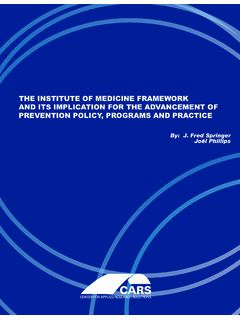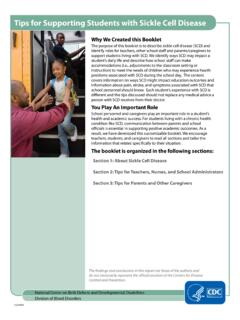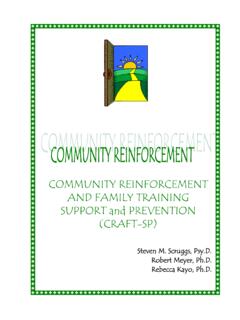Transcription of What interventions help teens and young adults prevent and ...
1 What interventions help teens and young adults prevent and manage behavioral health challenges? Context for this review At the request of the Colorado health Foundation, AcademyHealth undertook this review to assess existing evidence on interventions to help teens and young adults prevent and manage behavioral health challenges in middle and high school, college, community, and workplace settings. We examined previously synthesized research concerning the effectiveness of interventions targeting three areas: depression/anxiety, substance use, and suicide prevention. The goal of the review was to help the Foundation identify promising interventions across a broad range of behavioral health challenges experienced by teens and young adults .
2 Findings We grouped our findings according to the three broad categories of behavioral health challenges described above. A consistent finding throughout is the effectiveness of resilience-based approaches which aim to improve at least one individual ( , self-esteem) and environmental ( , school connectedness) factor in improving substance use, depression, and anxiety among teens and young Please see Appendix 1 for definitions of key terms used in this review. Depression and Anxiety. interventions that target populations at high risk for behavioral health challenges and include some type of cognitive behavioral therapy (CBT) in which individuals learn how to recognize, explore and change relationships between negative thinking, behavior and depressed mood are promising approaches for reducing depression and anxiety symptoms in teens and young adults .
3 In particular, approaches that target low-income populations and incorporate aspects of resilience-focused interventions are more effective than approaches that do not target environmental factors. Substance Use. Universal interventions that seek to improve social skills and increase knowledge about the social factors that contribute to substance use in teens and young adults can lead to reductions in illicit drug use. Targeted brief interventions incorporating some type of CBT can lead to small reductions in substance use, in particular, alcohol consumption, although the effect is minimized when compared to receiving an education-only intervention. Suicide Prevention. Psychosocial interventions such as dialectical behavior therapy in which individuals receive individual CBT and group therapy focused on skill building delivered in school, community and health care settings are promising strategies for reducing suicidal behavior among teens and young adults .
4 While many other types of suicide prevention interventions have been shown to improve knowledge of suicide and knowledge of suicide prevention among students, school staff and others, evidence is lacking on whether and how these interventions impact young peoples actual behavior. Additional considerations interventions vary in how they combine and implement different types of therapy or curriculum components, which limits researchers ability to directly compare them. Lack of long-term follow-up and adequate control groups in school-based intervention studies are key limitations of the research. Implementing interventions over long periods of time is difficult due to limits on the amount of school time that teens and young adults can spend on activities that are not strictly academic.
5 R A P I D E V I D E N C E R E V I E W Answer: Findings from this review suggest that targeted interventions incorporating some type of cognitive behavioral therapy (CBT) can lead to small, but positive improvements in a range of behavioral health outcomes for teens and young adults . Resilience-focused interventions (which often incorporate CBT approaches) that target both individual and environmental factors also demonstrate small, positive improvements in depression, anxiety, and illicit drug use. Given the wide variation in intervention design, populations studied, and outcomes measured, further work is needed to understand how, why, and for whom promising interventions may be most effective, particularly for racial/ethnic minorities, LGBTQ youth, and members of other historically disadvantaged groups.
6 January 2018 This review was supported by the Colorado health Foundation AcademyHealth conducted this rapid review over a six-week period using an established protocol that emphasizes timeliness, efficiency, and responsiveness to decision makers needs. The review synthesizes peer-reviewed systematic reviews published since 2010. A primary analyst undertook and revised the review. Two additional AcademyHealth analysts and two external experts provided input on the initial findings and draft report. Appendix 4 lists the search terms and databases used in this rapid review. 2 Appendix 1: Definitions Cognitive behavioral therapy (CBT). In CBT, individuals learn how to recognize, explore and change relationships between negative thinking, behavior and depressed , 17 Dialectical behavior therapy.
7 Dialectical behavior therapy is a modified form of CBT, in which individuals receive one-on-one therapy in addition to group skills training classes to help learn and use new skills for mindfulness, emotion regulation, and distress tolerance, among Interpersonal therapy (IPT). In IPT, individuals resolve interpersonal problems through a range of techniques ( , role playing), which are also intended to improve their access to social support and decrease interpersonal stress. These changes positively impact emotional processing and interpersonal skills and ultimately are intended to improve depression and anxiety Gatekeeper training. In gatekeeper training, individuals who interact regularly with young adults and teens ( , teachers, school counselors) are trained to recognize warning signs for suicide and respond Mindfulness interventions .
8 Mindfulness is defined as paying attention in a particular way: on purpose, in the present moment, non-judgmentally. 20, 25 interventions targeting mindfulness vary, but most incorporate a training period of guided meditation techniques focusing on mindful attention and awareness of breath, body, or mind and followed by independent Mindfulness interventions are often included with other components, such as yoga, cognitive-behavioral strategies, or relaxation skills training. Resilience-focused interventions . A resilience-focused intervention addresses at least one individual ( , self-esteem) and at least one environmental ( , school connectedness) resilience protective factor and can employ a variety of approaches including CBT.
9 Although there is some variation, resilience has been defined as the process of, capacity for, or outcome of successful adaptation in the context of risk or It is generally accepted that protective factors, both within an individual and in their environment, can help moderate risk for adversity and therefore facilitate resiliency that can in turn reduce the likelihood of poor outcomes such as depression, anxiety, or substance Social competence interventions . Social competence is having the personal knowledge and skills to deal effectively with the choices, challenges, and opportunities presented throughout interventions that target social competence use a variety of approaches including group skill building and role playing to improve social competence in teens and young adults .
10 These programs teach generic self-management personal and social skills, such as goal-setting, problem-solving and decision-making, and also teach cognitive skills to resist media and interpersonal influences, to enhance self-esteem, and to manage anxiety and Social influence interventions . Social influence interventions involve equipping teens and young adults with the skills and knowledge to resist peer and other social pressures to drink or use drugs. Approaches often involve correcting overestimates of the drug use rates of adults and adolescents, recognizing high-risk situations, increasing awareness of media, peer and family influences, and teaching and practicing refusal Third-wave CBT. Although the evidence is still emerging for the adolescent population, third-wave CBT approaches are becoming more prevalent.





